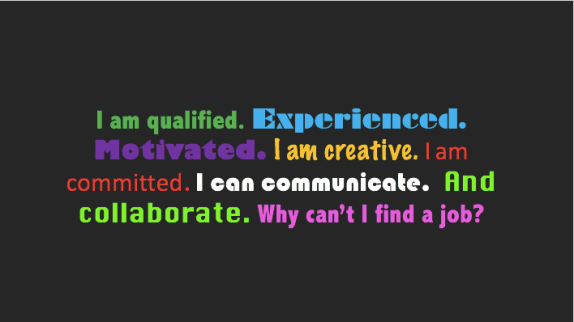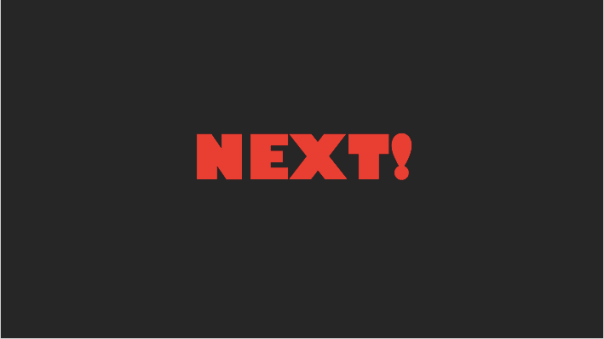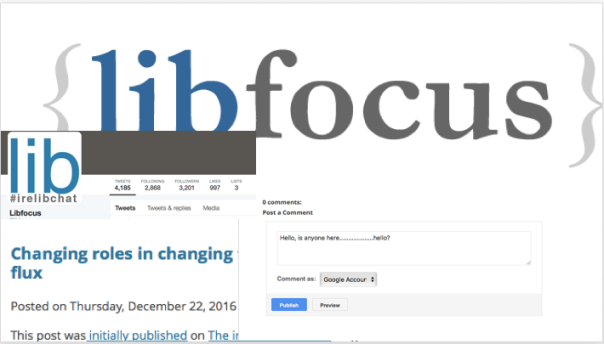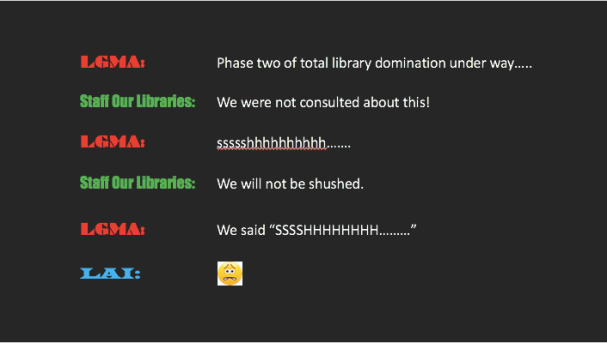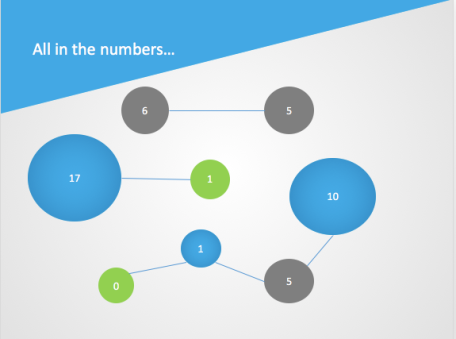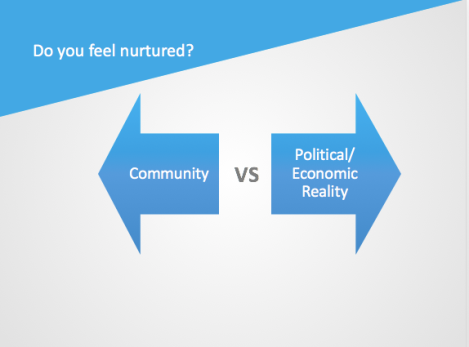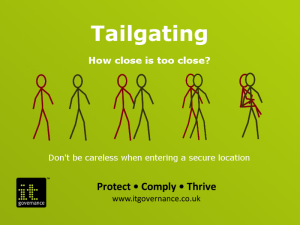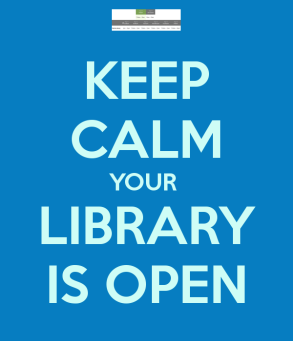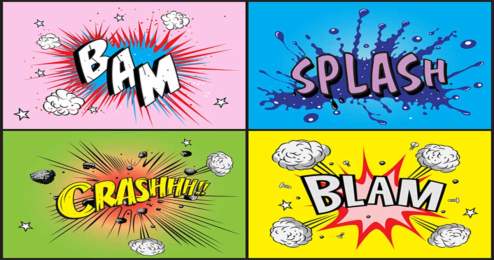I would like to begin this post on an optimistic note because I want to give some thoughts on the concept of Ireland’s national catalogue in our public libraries without focusing on the inevitable teething problems that occur with any monumental change in direction that a service undergoes. So, let’s assume that the new national catalogue in Ireland works exactly how it is supposed to. Let’s take that as our starting point. Let’s forget about problems with the actual catalogue. Let’s also forget about SIERRA’s awful search engine that all too often returns unexpected and very inaccurate search results when trying to find a common title. Let’s not worry for now about the fact that paging (item request) lists cannot be trusted or that the system often refuses to clear or move along requests. Let’s not worry too much about barcodes not matching the barcodes on actual items, or the duplication of item records. Let’s not trouble ourselves with the fact that SIERRA was never designed to understand things like text messages, or fines in the public library service. Let’s forget about it’s love of connecting to printers and its complete disregard for the environment. Let us put all that aside and be positive and from there take a look at the idea of our new national catalogue from a conceptual and slightly philosophical perspective.
So what is the idea really? Well, that every public library in the country is connected, sharing items and services. A patron can search the catalogue, find an item anywhere in the country and can have that item delivered to their local library in 3 to 5 days. In many ways it reminds me of the EU. Who did not love the idea of the freedom of movement of both people and goods across the continent? Like all ideas, it was perfect in its idealogical state. But putting an idea into practice requires a measure of control and regulation. And the moment you try to regulate freedom, well, you destroy it. Library members express their surprise and excitement at the new national catalogue because, in truth, it is a brilliant idea that makes more information more accessible to more people. However, what is it like in practice? How well thought out has the idea been? How well has it been executed? And what are the future implications of this new departure for our public library service?
Cost of transportation and the environment
After expressing their joy at such a service, the next questions patrons ask are: ‘how much will that cost?’ and ‘whose going to pay for it?’ The figures will likely never be released by the LGMA as they have a penchant for secrecy at the best of times, but from what I understand the cost of transporting one item stands at around .75 cents. A request list in my local library, small and rural, is usually 20-30 items long. Not only this, but it is the library that has to send the item out that incurs the cost. I work in a smaller county that has spent a lot of its budget in recent years developing excellent stock. Because it is a smaller county it has a smaller budget. The worry is that now this budget is going to be swallowed up by the cost of transporting its excellent stock all around the country. Of course, on the upside it does mean that borrowers in libraries that are poorly stocked will now have a much better range of items to borrow. However, does transporting books around the country really make sense? Rather than sending a book out to a library ten times a year, would it not be better to spend that money on buying an extra copy in the county? Not to mention it being kinder on the environment too. What will happen to library stock in the long term? If book buying budgets are smaller due to the cost of book transportation then won’t that simply increase the demand for requests in the future because individual libraries will be buying less books every year? So while right now you can get books quicker, in the future the queues may get much longer if the service is not properly supported with generous budgets.
It is interesting to consider how wasteful this new system might be. A scenario could arise in which I send a book off to Donegal from Laois. A few hours later a patron comes into the library in Laois and requests the book I just posted to Donegal. I go onto the catalogue and place another request. The system grabs another copy of the same book from Kerry and transports it to Laois. Is this not a wasteful system? In work on Saturday I sent books from Laois to Clare, Sligo, Mayo, Dublin, Wicklow, Limerick and Cork. I checked the LMS to see where other copies of those books were available. The book I sent to Limerick was also available in Clare, which is obviously much closer to Limerick than Laois. The LMS does not understand geography. It will search the home county first, but after that it will simply take the next available copy it finds irrespective of where that copy is located. This means that every book that leaves a county is potentially leaking efficiency. The Limerick copy could have saved 150kms of distance, which will cost less money and less CO2 emissions. And anyone who works in a public library will know that a lot of items that are requested are never actually picked up in time by patrons. I wonder how much money is wasted transporting items to libraries around the country only for the item to never be collected and read? It seems like it is a system that is very wasteful and inefficient.
What ever happened to e-books/ e-resources?
Libraries elsewhere have been pumping money into e-reading services. Why? Well, because it is extremely efficient and location is not really a barrier to reading. Would it not be wiser to allow libraries to develop their own stock and for the money to be put into e-reading services nationally? In fact, we do have some great e-resources available through public libraries (including books and magazine), but currently the e-books service is not actually connected to the national catalogue so when a patron searches for a book it only gives them the option of physical items and ignores the fact that we do actually have a few thousand e-books as well. If every university catalogue can be connected to electronic resources, why can’t the public library catalogue?
My search for the National Geographic magazine returned the following result on Libraries Ireland:
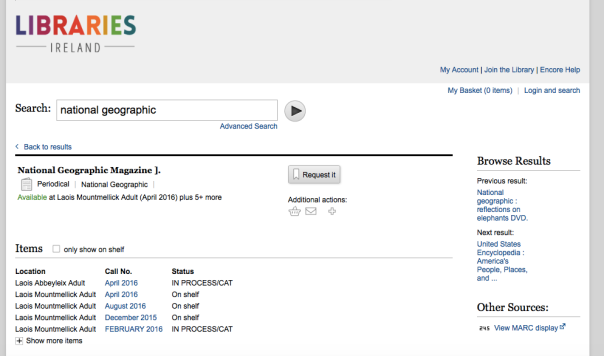
The results do not give me an option of an electronic copy despite the fact that I know one is available online through Zinio Magazine Collection and Laois Libraries website.
Searching for ‘My Husband’s Wife’ using the e-books filter returns the following result:
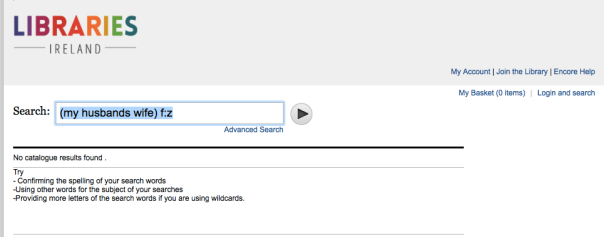
This book is actually available to library members through Bolinda e-books services, again available through your local library’s website. Maybe spending some money connecting our already existing e-services into the national catalogue might actually prevent transportation wastage on physical items? Of course, the defence will be that it is not yet a finished product. But how much money is going to be wasted in the meantime while the LGMA work on finishing what they have started? Would it not be better to put the infrastructure in place first before rolling out a service? It certainly calls into the question the ability of the LGMA and the government to deliver an adequate and effective library service. Reading a review of a bicycle recently, a reviewer commented, “when you buy quality, it only hurts once”. Proper planning in this sense is a lot less painful in the long run, and the LGMA seem incapable of thorough research and planning.
Let’s digress: using an academic library LMS in public libraries
I worked in the UK at the University of Surrey last year. We used an academic LMS called ALMA. It is important to question why the choice was taken to use SIERRA as the LMS of choice for this new national catalogue. SIERRA was first used in Ireland by Trinity College and UCC. These are naturally two academic libraries. In fact, SIERRA is a system designed for academic libraries. I noted earlier that it does not understand geography very well. It has an option when requesting books to ‘hold copy returned soonest’. In an academic library, that may only have four library buildings (at most) in close proximity to each other then holding the next copy returned is sensible, especially because if there is more than one library in a university they will be stocked by subject anyway. The books don’t have to be transported from one location to the next. In the public library service, we have more than 300 library branches so holding the next copy returned means a book could be travelling 300kms from one branch to another. SIERRA has no understanding of geography; in an academic library it does not need to. Of course, it will search the local authority first and then default to the next copy outside of the county if none are available in county. However, by my estimation, this only actually happens about 80% of the time. I have received copies of items requested by members of my library arrive from outside the county when I know there to be a copy sitting on the shelf just a few feet away. Of course, you can alternatively find a copy of an item and make a specific item request. However, many items that were lost on HORIZON transferred over to SIERRA as ‘on shelf’ and so the item you request may never actually arrive. SIERRA does not understand time either. If a copy is due back the next day into the authority where it has been requested, it does not stall the request and wait for that copy to return. Instead, it goes outside of the county and pulls a copy from elsewhere. There does not seem to be any pattern or logic to how or where it pulls items from. It is hugely wasteful of resources and is not a system that understands public library processes or procedures.
Also in an academic library, you have a small team of cataloguers all working to the same standards. At the University of Surrey, we worked to British Library standards. With the previous LMS HORIZON cataloguing was a problem, but it was manageable. You see, some of the people cataloguing started out card cataloguing and in the last 30 years have never updated their understanding of cataloguing. When we moved over to electronic cataloguing and to AACR2, there were huge gaps in knowledge and new cataloguing standards were not followed consistently. And I imagine very few cataloguers today in the authorities really understand RDA/MARC21 because they are simply too busy to continuously up skill. In the past these inconsistencies were limited because even though the cataloguing standards may not have been the best, they were at least somewhat consistent within each authority. We now have a catalogue that has 15 million items and god only knows how many people are adding records on a daily basis in the individual branches. The catalogue is currently a huge problem. I frequently have to go back into HORIZON in order to find what I am looking for. I have seen items with mis-spellings in the author’s name. All item records should be attached to the same bib record so that when requests are place a nice orderly queue is formed. However, I saw one item with multiple bib records. The first had 6 items attached and there were more than 40 requests on the record. The second record actually had 60 items attached but with no requests on it. It was the same book, but the bib record had been duplicated. The main benefit of a national catalogue is the request system and the ability to share information, but the actual catalogue as it is is making the request system very inefficient and ineffective at times.
I could go on and on about the catalogue and the inaccessibility it creates. However, it is important to question why SIERRA and Innovative were chosen? The LMS is simply not fit for purpose because it is an academic library system being used in a drastically different public library setting.
The scenic route to ‘National Procurement’
Of course, national procurement is coming down the line as part of the national catalogue in which all libraries’ stock will be purchased centrally. The current national catalogue is impressively diverse. But this diversity will diminish with national procurement. Eventually, will all libraries in the country simply have the same stock anyways, thereby alleviating the need for a courier system? If every library has the same books and are equally stocked in terms of quantity, then there will be no need to borrow from around the country. Why not just do this now and save us all the hassle and expense? Or better still, develop e-book services instead?
My Open Library, ethics, surveillance, democracy, diversity and the future of public libraries
There are other questions of course. Like how does the national library catalogue tie in to the Open Library plans? Surely these two systems have been considered by the LGMA together? Surely they are part of the same long term vision. The National Catalogue certainly seems to suggest that users will have a better service if they go online and order items that they want and then drop in to pick them up at the branch. The national library catalogue does seem to be pushing people more towards online services and may well diminish the services for those who are not capable or inclined to visit their library online. This is because stock in libraries looks like it’s about to be negatively affected by the cost of the national catalogue. So, is the national catalogue simply a prelude or set up to the open library agenda?
Philosophically, there is a tendency to consider all authorities as the same in this strategy. There are fundamental problems with this. Not only in terms of reducing the diversity of library stock, but also in terms of failing to understand the diverse needs of library users which varies greatly from county to county. There is a bigger issue of controlling information rather than freeing up information. National procurement, coupled to a national catalogue, coupled to an open library results in greater control of library members and of library stock. It leads to greater surveillance in libraries (a fundamental principle that libraries are at odds with), but also greater control of information that people have access to. The cynics amongst us might suggest that what is really happening is that the government is exerting greater control over our freedoms. A national catalogue creates a national database of civilians whose personal information and reading habits are now accessible to government when before they were localised. A librarian in any branch in the country has access to a huge national database of phone numbers, emails and personal addresses, and while we cannot see reading history, we can see what anyone in the country is currently reading. I wonder how members of the public feel about this from a privacy and security perspective. National procurement threatens to centralise the control of information and people’s access to it, as well as exerting greater control over what information the public have access to freely through their libraries. And finally, add to this an Open Library system in which members of the public are no longer able to enter a public building without being video recorded and personally identified and you have the destruction of a key pillar of freedom in a democratic society. In fact, libraries could be the last truly free space left in our society and the national catalogue, for all of its promise, should not be viewed separately from other government initiatives.

